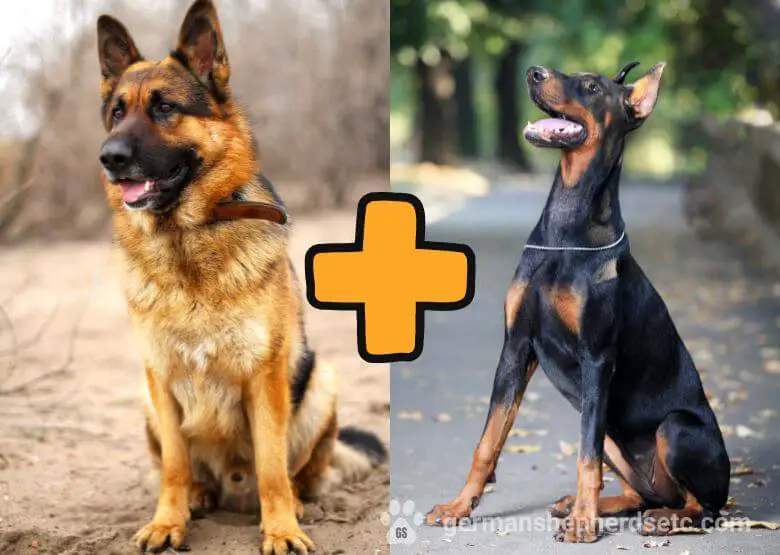Table of Contents
Breeders and kennel owners sometimes intentionally crossbreed their dogs with other breeds so that the puppies inherit the best features from their parents, both in appearance and character. Often, potential buyers are offered a German Shepherd and Doberman mix with the assurance that they are reliable and faithful guards. But what are such mixes, and what is the temperament of these huge and fearsome dogs?
What Does the German Shepherd and Doberman Mix Look Like?
The German Shepherd and Doberman mix is a relatively large dog, typically weighing between 75 and 100 pounds and standing 24 to 28 inches at the shoulder. The size and weight of the mix can vary depending on the size of its parents and the specific genetic traits that are inherited. Generally, the mix is somewhat larger and taller than the German Shepherd but shorter and more compact than the Doberman. The mix has a strong, muscular build with long, thin paws that are capable of running and jumping with ease. Its harmonious and lean body gives it an athletic appearance that is both powerful and elegant.
Their bodies are harmonious, lean, and thin, while their paws are long and thin, yet muscular. They have medium-length tails with pointed tips, although most puppies have their tails cropped. The pointed and elongated shape of their head gives them a more Doberman-like appearance than German Shepherds. They typically have a charcoal-black color with red or light beige patches on their limbs, belly, neck, and thorax, and short, shiny, hard coats inherited from their parents.
The size and appearance of the German Shepherd and Doberman mix make it an impressive and imposing presence, especially when it comes to guarding and protecting its territory.
The German Shepherd Doberman Mix Character Traits
Due to their impressive size and menacing appearance, Dobermans undeservedly acquired the reputation of being vicious and aggressive. But, in fact, these large dogs are very friendly, loyal, and sociable pets.
The mix of German Shepherd and Doberman has all the positive traits inherent in these two breeds. These hybrids have a calm, balanced, and serious nature, and they are excellent defenders and guards.
From the first minutes of being in the house, a hybrid puppy will take upon itself the guarding functions of the territory and the household, treating its work with complete dedication and responsibility. The mix is distrustful and suspicious of strangers but will never harm a person if that person has come accompanied by the owner.
The puppy, like both of its parents, has a sharp mind, shrewdness, and intelligence. Before undertaking any action, it will study the situation carefully and will not bark or attack people for no reason.
These good-natured and affectionate dogs are great with children, but other animals in the house can be a problem. Like the Doberman, the mix is not very friendly to other pets and may consider a cat or small dog to be its rightful prey. Therefore, if a mix of these two breeds lives in the house, it is advisable not to get any other animals.
The owner will not have any trouble with training and raising a hybrid puppy. These animals are easy to train, they quickly memorize commands, they are obedient, and they will never question the authority of the owner.
Mixed dogs do not tolerate being left alone for a long time. These dogs consider all family members as members of their own pack and need attention and companionship to make them feel needed and loved.
An excellent protector, a reliable guard, and a faithful companion – this is how you can characterize the mix in whose veins flow the blood of Dobermans and German Shepherds. This huge dog with a good-natured and calm temperament will be a loyal, reliable, and loving friend to the whole family.
Health Considerations for German Shepherd and Doberman Mix
While crossbreeding can sometimes increase the genetic diversity and therefore the health of the resulting offspring, it is still important to consider potential health issues that may arise. Both German Shepherd and Doberman breeds are prone to certain health problems, so it is important to research the health history of the parents before purchasing a mixed-breed puppy.
Both breeds are prone to hip dysplasia, a condition in which the hip joint doesn’t fit properly, leading to pain and arthritis. Other potential health concerns include heart problems, eye issues, and ear infections. It is important for potential owners to keep an eye out for any signs of health problems and to take their dogs to the vet for regular check-ups.
Exercise Needs of German Shepherd and Doberman Mix
Both German Shepherds and Dobermans are known for their high energy levels and need for exercise. The mix of the two breeds will also require plenty of exercise and mental stimulation to prevent boredom and destructive behavior. These dogs are highly intelligent and require activities that will challenge them mentally as well as physically.
Owners should plan to take their German Shepherd and Doberman mix for long walks, runs, or hikes daily. Regular play sessions and training activities can also help to keep the dog’s mind and body active.
Training and Socialization of German Shepherd and Doberman Mix
As mentioned previously, the German Shepherd and Doberman mix is highly intelligent and trainable. Early socialization and training is important to help prevent aggressive or fearful behavior towards strangers or other animals.
Socialization should begin at a young age and should involve exposure to different people, animals, and environments. Consistent and positive training methods can help to reinforce good behavior and prevent unwanted behaviors.
Conclusion
The German Shepherd and Doberman mix is a large, loyal, and affectionate dog with a calm and serious nature. While they make great protectors and guards, they require plenty of exercises and mental stimulation to prevent boredom and destructive behavior. Potential owners should also consider potential health issues and plan for early socialization and consistent training to prevent unwanted behaviors.

